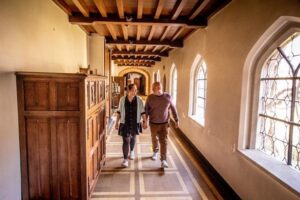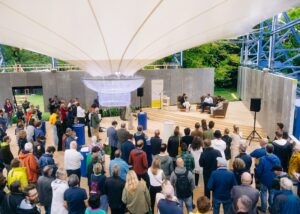Nurturing Sustainable Tourism
VISITFLANDERS, the organization charged with managing the destination, is reshaping tourism in Flanders, where sustainability is the cornerstone of every venture. Anchored by community collaboration and eco-aware practices, the region is crafting a tourism blueprint that cherishes heritage and envisions a vibrant, community-led approach.
The ‘Travel to Tomorrow’ vision encompasses diverse sectors, underlining the pursuit from preserving historical gems like Saint Godeliva Abbey to addressing cruise tourism’s eco-impact, fortifying Flanders’ economic, social, and environmental realms. Flanders seamlessly merges historical richness with modern sustainability aims, illustrating a forward-thinking tourism model.
Join us as we explore Flanders’ sustainable tourism endeavors and success stories.
Flanders Sustainability Initiatives & Impact Stories
Destination Flanders has integrated sustainability at every level. From rehabilitating historic sites like Saint Godeliva Abbey to examining the impact of cruise tourism and MICE, Flanders ensures that its tourism offerings are both enriching and responsible.



Saint Godeliva Abbey
Saint Godeliva Abbey’s transformation into a community hub by 2026 is marked by key sustainability efforts:
- Reintroduction of Flemish Heirloom Varieties: Revitalizing the abbey gardens with traditional Flemish vegetables and flowers, enhancing biodiversity and agricultural heritage.
- Water Conservation: Including using reclaimed water from historic cisterns and new rainwater collectors.
- Community Engagement and Heritage Preservation: Involving locals and volunteers in garden restoration and reviving the abbey’s beekeeping traditions.
- Space Utilization: The abbey’s basement is repurposed for mushroom cultivation by Kopje Zwam using coffee grounds from local cafes. Former cells are becoming co-working areas.
Cruise Tourism in Flanders
Cruise tourism in Flanders, a significant contributor to CO2 emissions, is being addressed through comprehensive studies and actionable recommendations.
Passenger Quotas: To balance tourism with sustainability, one of the key recommendations includes introducing passenger quotas for cruise ships. This measure aims to manage the number of tourists arriving via cruise ships, thus reducing environmental impact.
Green Conferences and Events
Flanders takes its conferences and events seriously, emphasizing venues that prioritize energy and water conservation. Resources like its Sustainability Guidelines for Events are more than just tools; they represent a commitment to sustainable practices.
The Pavilion at Stories Unfold is a great example of sustainable events in Flanders. The pavilion rests on screw piles that are wound into the ground much like a screw into wood, which eliminates the need for pouring a concrete foundation. After Stories Unfold, the screws will be neatly removed, leaving no trace whatsoever. Additionally, the pavilion walls consist of classic formwork panels that are normally used to pour concrete, but now serve as a framework for the surroundings and to bring the outdoors indoors.
Behind the Scenes
In Conversation with Peter de Wilde
With growing demands from residents for local-friendly destinations that are free from overtourism, how can destination managers and developers strike the right balance, one which satisfies both tourism businesses, visitors and locals?
Flanders sets an example with its mission to create flourishing destinations where visitors, communities, and local businesses can derive maximum benefit.
Peter De Wilde, CEO of VisitFlanders, shares how the ‘Travel to tomorrow’ tourism recommendation came into being and how purposeful marketing can help destinations to ensure their sustainability.

Strategy & Partnerships
Some of the sustainability goals that VISITFLANDERS has set itself (source):

Collaboration is key to Flanders’ approach. Partnerships with organizations like NECSTouR are driving change, focusing on creating actionable plans to monitor and reduce greenhouse gas emissions, while also sharing insights and best practices.
The vision is collective progress, where every stakeholder plays a role in shaping a sustainable future for tourism.
Curious how destinations in other parts of the world master sustainability and regenerative development?
Visit our leading destinations section for additional stories and good practice examples!

